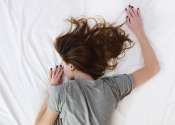Popular teenagers sleep less than their peers, study finds
Due to a later melatonin onset and increased alertness in the evening, teenagers often find it hard to fall asleep at a time that would allow them to clock up the recommended eight to ten hours of sleep each night.
May 1, 2024
0
44









